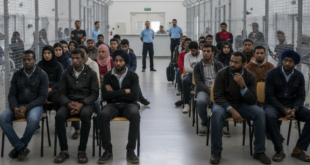Benin City in Nigeria’s south is a hub for illegal migration in West Africa. That’s why the German international broadcaster Deutsche Welle (DW), within the framework of its 77 Percent youth project, held a town hall debate on 18 October. DW’s Maja Braun was there and she sums up the event.
Aigbe Omoregie is one of those who made it. At the age of 13 he started selling eggs in his native Benin City. Today he’s a billionaire businessman who makes his money supplying paint locally and abroad. Aged 38, he is just slightly older than the target group Deutsche Welle invited to the town hall debate.
“What sets me apart from those of you who want to go to Europe?” he asks. “Nothing. Only I decided to stay and build something.”
For a moment there is silence in the audience. Over 300 students and other young people had come to the venue at the school of agriculture at the University of Benin.

The two-hour debate was broadcast live across Nigeria via DW’s partner broadcaster, Nigeria’s private Channels TV. Facebook users could also follow and participate in the debate on DW and other online platforms.
In the thick of the migration dilemma
Benin City has a reputation beyond Nigeria’s borders as a centre for human trafficking. Anyone wanting to leave will quickly find someone who can help. Everyone seems to know someone who can help young people get at least to Libya. But everyone also knows someone who has come back from a migrant camp in Libya or a brothel in Italy.
On the podium and in the audience, one can hear the same haunting message: It is a very bad experience that is not worth it. However, the greatest applause went to former student representative Divine Oguchi Omale. “Sure,” he said, “when you’re there, you wish for nothing more than to be home again. But you’re scarcely back in Nigeria for three weeks, when you want to go again because you realize it was better over there than here!”
The reason: There are simply no jobs, even for those with a good education. “Even when I have finished school, the government is only interested in those who have graduated from Cambridge or Harvard,” Omale said.

Solutions from above and below
The state government representatives had a tough time contending with the anger in the audience, although it has put various programs in place, for example, to improve the quality of tertiary education and setting up an online job exchange to bring graduates into the private sector.
The returnees are offered training over several months, as well as, initial financial support. But that draws criticism too. “Does that mean we should first make the dangerous journey so that we can obtain support from the government when we get back?” one student asked to thunderous applause.
So what should they do? A few people have concrete suggestions: Reduce the tax for start-up companies, or introduce targeted employment for young staff in the public service with low entry-level salaries, because “it is not that the government and institutions are unwilling, but rather that the employees are not able, as they are far too old,” said one contributor to the debate.

One student was no longer prepared to leave it to the government. “Imagine the government is your father. Do you want to be a failure just because your father failed?”
Many, including businessman Aigbe Omoregie, agree: “You must shape your own life,” he said. There are plenty of opportunities, and problems can also turn out to be opportunities, he argued. “When you encounter a problem, search for a solution and you could make millions,” was his advice.
He was not able to convince everyone. When DW moderator Edith Kimani concluded by asking the question: “Your future, Here or abroad?” the initial loud responses of “here” were followed by some more undecided calls of “or maybe abroad?” After the debate many said they would actually like both options – as long as they were legal.
© Deutsche Welle
 THE AFRICAN COURIER. Reporting Africa and its Diaspora! The African Courier is an international magazine published in Germany to report on Africa and the Diaspora African experience. The first issue of the bimonthly magazine appeared on the newsstands on 15 February 1998. The African Courier is a communication forum for European-African political, economic and cultural exchanges, and a voice for Africa in Europe.
THE AFRICAN COURIER. Reporting Africa and its Diaspora! The African Courier is an international magazine published in Germany to report on Africa and the Diaspora African experience. The first issue of the bimonthly magazine appeared on the newsstands on 15 February 1998. The African Courier is a communication forum for European-African political, economic and cultural exchanges, and a voice for Africa in Europe.


































